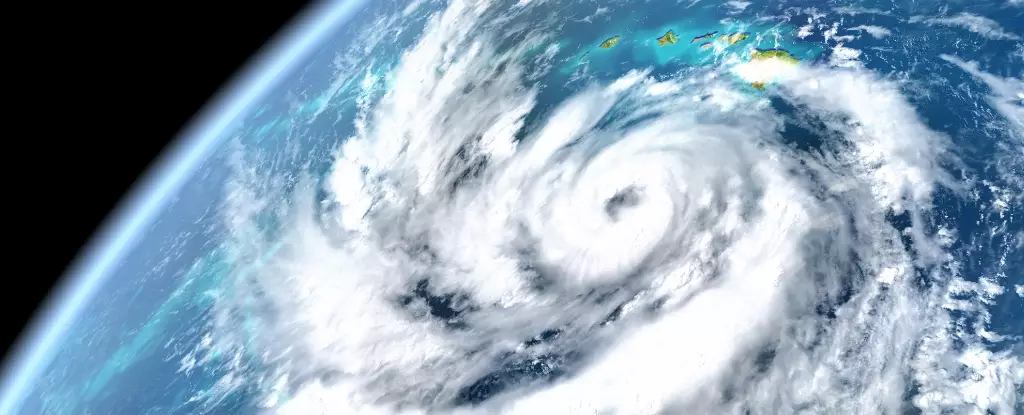In a world fraught with climate uncertainty and increasingly erratic weather phenomena, a glimmer of hope has emerged from the hallowed halls of Microsoft. Their groundbreaking AI model, aptly named Aurora, has demonstrated a remarkable ability to outstrip traditional forecasting methods in weather, air quality, and hurricane tracking. This innovative technology, which remains on the sidelines of commercialization, has showcased capabilities that not only challenge existing norms but also redefine our understanding of predictive science. Findings published in *Nature* reveal that Aurora can produce 10-day forecasts and predict hurricane paths with a level of accuracy previously thought unattainable.
The conversations surrounding Aurora intensify when we consider its reliance on historical data alone. Senior author Paris Perdikaris notes that for the first time, an AI system has outperformed established forecasting centers like the US National Hurricane Center, delivering an optimistic perspective amidst a backdrop of intensifying climatic events. Yet, while these advancements are commendable, they beg a crucial question: Are we ready to place our faith in an algorithm able to decode nature’s complexities?
Transforming Predictive Science
Traditionally, weather forecasting has anchored itself in foundational physical principles—conservation of energy, momentum, and mass. This methodology, while historically reliable, comes replete with enormous computational costs. Historically, it required significant computational power and resources, which made accurate predictions a massive financial undertaking. Aurora, on the other hand, presented an astonishingly lower cost of operation, reportedly several hundred times cheaper. While the technological prowess displayed by Aurora brings an exhilarating promise, the ease of its application raises concerns about depending too heavily on artificial intelligence in a domain where human expertise has long been the standard.
Moreover, Aurora is not alone in this race. The emergence of similar models, such as Huawei’s Pangu-Weather, hints at a broader trend where advanced AI could outpace conventional meteorological methods. This raises eyebrows concerning a potential arms race in technological supremacy—who will win this contest to control the future of weather predictions, and what ethical considerations will accompany such progress? Are we prepared to allow machines to navigate the complexities of nature while we watch from the sidelines?
A New Paradigm in Forecasting
The statistics surrounding Aurora’s capabilities are remarkable. According to early simulations, it accurately predicted the catastrophic typhoon Doksuri days in advance while traditional forecasts misjudged its trajectory. Such achievements potentially herald a paradigm shift in which our reliance on human-driven forecasting may diminish. The European Centre for Medium-Range Weather Forecasts (ECMWF) is faced with the reality that Aurora’s efficacy far surpasses its own capabilities in 92% of cases for ten-day global forecasts. As a global benchmark, the ECMWF is now in a position where it must confront its vulnerabilities as an established authority in weather predictions.
Florence Rabier of ECMWF has taken a proactive approach by developing their own AI learning models alongside traditional ones. While embracing this shift is prudent, it raises crucial debates about the outcomes of relying on AI and whether we are sacrificing necessary human oversight for machine precision. Increasingly, we are forced to grapple with the dichotomy of innovation versus caution—a balancing act that could define the efficacy of future weather forecasting.
The Ethical Dilemma
As the race for AI supremacy unfolds, ethical considerations inevitably arise. On one hand, harnessing AI’s capabilities promises efficiency and effectiveness that can save lives in the face of natural disasters. On the other hand, there exists a palpable fear of dependency on a technology that we still don’t fully comprehend. What happens when AI algorithms shape our understanding of the world through a black-box model of computations? Can we truly trust non-human decision-makers to convey the nuanced realities of meteorological phenomena?
While Aurora exemplifies outstanding technological advancements, it simultaneously forces us to confront the question of accountability. Should AI be handed the reins when it comes to forecasting imminent climate threats? Will society truly benefit, or will we inadvertently strip away the critical human insight that has guided us through past climatic challenges? The journey toward embracing AI in meteorology promises a tantalizing glimpse into a future where our understanding of the environment can evolve. Yet, we must approach with caution as we peer into the future, keeping a vigilant watch over the complexities that lay ahead.


Leave a Reply